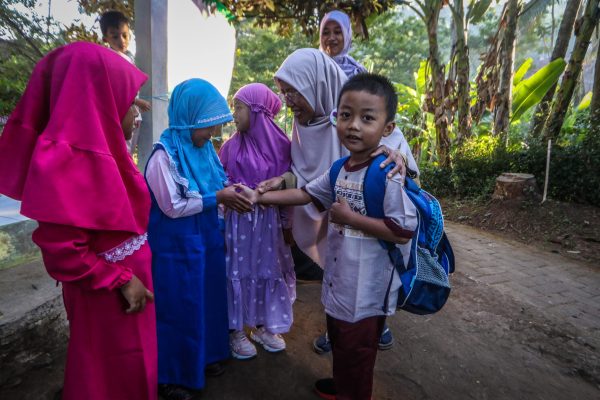In his final year in office, Nadiem focused on his leading initiative — introducing a new curriculum and concept of Merdeka Belajar (Freedom to Learn), officially launched on 11 February 2022. This curriculum reform is underpinned by the aim of tackling chronic problems of learning loss among Indonesian students, which can be primarily attributed to subpar educational quality.
Curriculum revision extends beyond Nadiem’s administration — this pattern of change has been apparent in appointed ministers’ policies over the past 15 years. But Nadiem’s recent curriculum overhaul distinguishes itself by instilling optimism about integrating components that resonate with policy coherence and a systems thinking framework.
Policy coherence fosters policy integration and holistic alignment towards shared objectives. Systems thinking requires an understanding of the interactions and feedback loops among diverse system elements, acknowledging that modifications in one part of the system will have reverberating impacts. In practice, the systems thinking framework involves critical concepts like transparency, collective action and stakeholder engagement. This framework is imperative in addressing Indonesia’s chronic educational problems, which primarily stem from impractical past policies and grow in complexity as they intertwine with emerging external challenges.
Nadiem’s curriculum demonstrates transparency in its formulation, implementation and potential outcomes by providing readily available information to the public through dedicated online platforms. The curriculum also exhibits more explicit goals for enhancing quality education by emphasising fundamental skills of literacy, numeracy and logical thinking, narrowing the curriculum’s scope. This is coupled with complementary policies, including a new instrument of national assessment and adjustments to the university entrance exam, offering cohesion between Nadiem’s policies.
But the curriculum and its supporting policies also have several shortcomings. Notably, the mechanism for ensuring public accountability raises significant concerns, particularly regarding stakeholder engagement, public discourse and adaptive responsiveness.
For instance, the discourse surrounding the new curriculum appears to overlook the significant role of Initial Teacher Education (ITE) institutions, in education. Indonesia hosts more than 314 ITE institutions, with considerable quality and program disparities. But current policies lack a strategy to address and narrow this gap.
The policies also do not clarify how these institutions should align with and adapt to the concept of Merdeka Belajar at the school level. While Nadiem introduced the Kampus Merdeka (independent campus) policy as an extension of its primary emphasis is student mobility and university accreditation. The question of how these prevailing policies might contribute to bridging the quality divide among newly graduated teachers from diverse ITE institutions remains unanswered.
Another concern surrounds the one-sided nature of the government narrative, which leaves minimal space for critical perspectives and suggestions. Public discourse involves diverse stakeholder engagement to uphold policy coherence and foster systems thinking. This discourse has the capacity to illuminate overlooked domains, such as the strategic response to emerging critical issues like AI advancement or aligning education with the 2030 sustainability framework, while identifying discrepancies or contradictions between policies and societal expectations.
It then becomes the government’s responsibility to capture the narrative emerging from public discourse and stakeholder engagements through adaptive policy measures and feedback mechanisms. But this responsibility is difficult to shoulder.
The government’s inadequacy in adapting policy feedback is evident in the ongoing predicament surrounding school enrolment under the zonation policy. Introduced in 2017, this policy aligns with Merdeka Belajar to facilitate impartial access to quality education while mitigating biases and favouritism towards particular schools.
Nadiem’s decision to maintain the zonation policy stems from an analysis of its perceived benefits. Still, school distribution across Indonesia diverges across educational tiers, forming a pyramid structure where elementary schools predominate, followed by junior and senior high schools. This uneven distribution, compounded by regional disparities, has led to persistent annual enrolment challenges since the policy’s inception.
Upon requests for clarification, Nadiem has attributed the policy’s inception to the former minister, Muhadjir Effendy. Yet Nadiem refrained from outlining the strategy to optimise the policy’s benefits. Conversely, Muhadjir held local governments accountable for their failure to elevate the overall quality of schools within their respective regions, which led to intricate implementation challenges.
These examples indicate missing policy coherence and systems thinking elements in Nadiem’s policies. Assuming Nadiem will not continue in office after the 2024 election, a comprehensive policy impact assessment will only be feasible after his tenure. Still, he has an opportunity to effect change and leave behind a legacy as a reformer of the education sector.
Nurhadi Hafman is an Instructional Designer at the United Nations System Staff College.
The findings, interpretations, and conclusions expressed herein are those of the author and do not necessarily reflect the views of the United Nations or the UNSSC.

